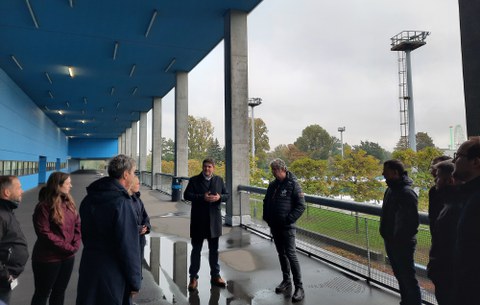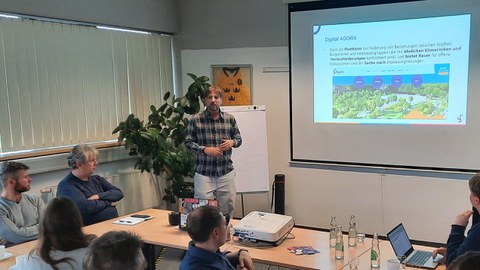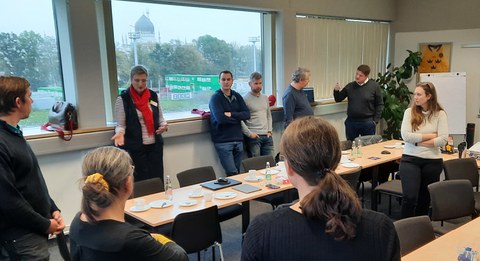Oct 27, 2023
First Quarter-workshop of the Model Project Smart City Dresden in Friedrichsstadt

Workshop mit Ortsbegehung: Gunnar Krisch (Mitte) führt die Gruppe durch das Sportparkgelände im "Intelligenten Quartier" Dresden Friedrichstadt
The implementation phase has been reached and now the work in the Smart City Dresden pilot project is becoming more concrete. The first administrative workshop was therefore held in one of the three "smart neighbourhoods" selected for the model measures: Dresden Friedrichsstadt.
Science workshops
In the model project (MPSC) funded by the German government, digital measures in the sense of sustainable, integrated and community-oriented urban development are to be developed and tested in model neighbourhoods (in addition to Dresden Friedrichsstadt, Johannstadt and Dresden-Ost/Prohlis).
Administrative workshops are part of the accompanying scientific and synthesis research carried out by WISSENSARCHITEKTUR - Laboratory of Knowledge Architecture - a special feature of the Dresden model project. Here, those responsible for the measures will have the opportunity - beyond the more organisational coordination meetings - to engage in a targeted exchange of content. The scientific team also contributes input from research and pools the results in order to identify synergies.
The teams from WISSENSARCHITEKTUR and Eigenbetrieb IT Dienstleistungen (EBIT, project management) met with their colleagues from the administration in the Joynext Arena.
Guest Speaker: Dr François Jost (European Citizen Science Association)

Dr. Francois Jost berichtet über Citizen Science
For Kick-Off, Dr François Jost (European Citizen Science Association) was invited. He provided information on the field of citizen science: Research projects that are carried out with the help of interested laypeople, for example by collecting data for science.
In particular, Jost presented AGORA, a Horizon-funded project since January 2023, in which best-practice tools are to be developed to encourage citizens to get involved in social goals such as climate protection. The ensuing discussion yielded some points of contact with smart city measures and impetus for the AGORA project, whose local kick-off workshop will take place in mid-November at the Bürgerbüro Dresden.
Site inspection in the Ostra area
Afterwards, host Gunnar Krisch (Eigenbetrieb Sportstätten Dresden), head of the "Digitaler Sportpark" Ostragehege project, took the group on a tour of the site, explaining the topography of the Friedrichstadt neighbourhood and planned and potential smart city measures from the rubble hill.
Sports park app and smart energy model for the municipal hospital
The participatory project aims to bring together the use of the sports park, including the Heinz Steyer Stadium. A "sports park app" as a digital platform for all users such as clubs, citizens, tourists and companies will enable access to offers from the administration and private organisations. The app is intended to supplement the existing booking and billing systems, contribute to the automation of processes and sustainably improve integration and networking between the population, administration and private stakeholders.
The "Development of a smart energy model for the Friedrichsstadt Municipal Hospital" was presented by the Office for Economic Development. The measure is concerned with the development of an integrated energy management system that will enable cross-sector control of the supply system. In order to optimise electricity, heat and electromobility in operations, the existing energy systems are to be integrated and controlled with intelligent measurement and control systems.
Networking and discussions
The presentations were followed by an interactive networking session, which was moderated by Paul Stadelhofer and Anja Jannack (WISSENSARCHITEKTUR). The interfaces established in previous strategy workshops were scrutinised, and the status of the projects and potential points of contact were supplemented and updated.
The localisation in diagrams on the flipchart quickly turned into lively group discussions. Findings from the clinic's smart energy model could become relevant (also locally) for the sports park, just as the "Open data for citizens, business and administration" measure (municipal statistics office and business informatics at TUD) can be discussed via expertise and application via the sports park app. The scientific team recorded the results and clarified the next steps with the project partners.
After constructive discussions in a pleasant atmosphere, the 1st neighbourhood workshop came to an end. And those who had made a reservation were able to watch the ice hockey game next door afterwards.
